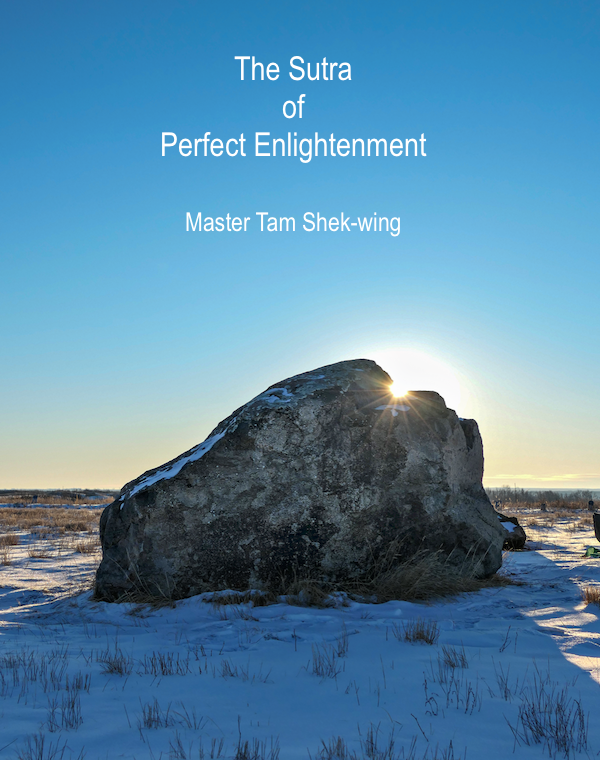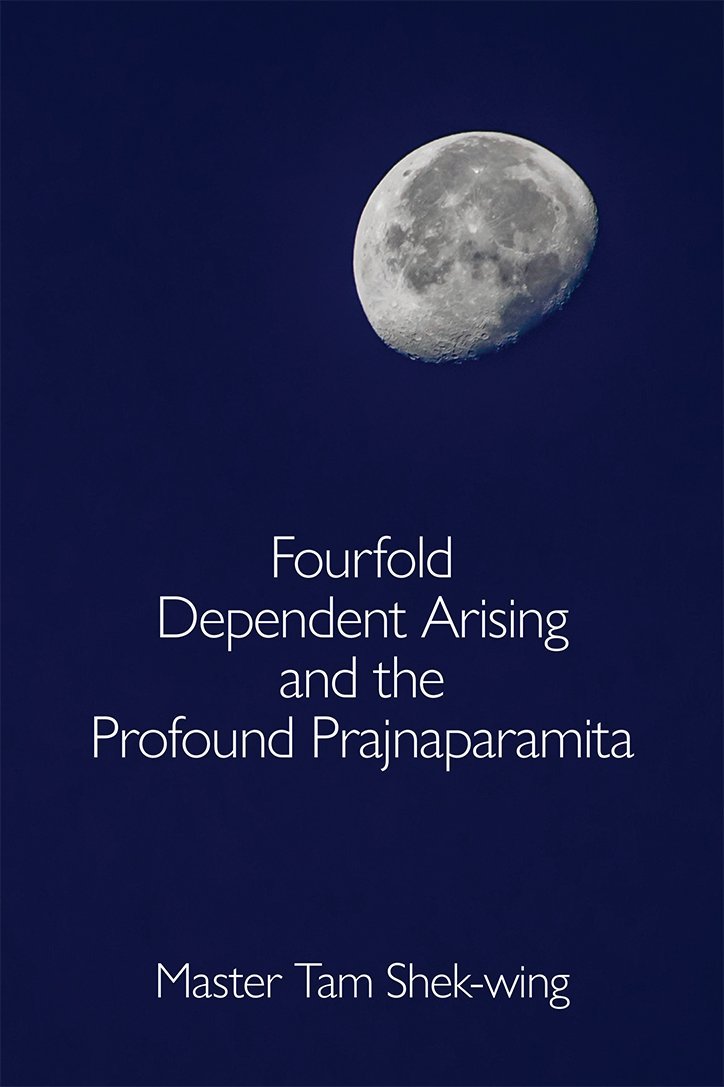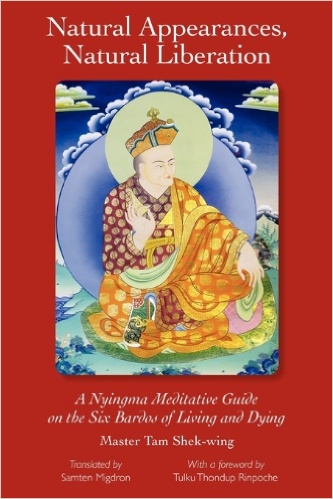Perfect Enlightenment 15: Buddha Teaches the Perfect Enlightenment Being Immovable
Show scripture (Chinese). 爾時,世尊告金剛藏菩薩言:「善哉!善哉!善男子!汝等乃能為諸菩薩及末世眾生,問於如來甚深祕密究竟方便,是諸菩薩最上教誨了義大乘,能使十方修學菩薩及諸末世一切眾生,得決定信,永斷疑悔。汝今諦聽!當為汝說。」時,金剛藏菩薩奉教歡喜,及諸大眾默然而聽。 「善男子!一切世界始終生滅,前後有無,聚散起止,念念相續,循環往復,種種取捨,皆是輪迴。未出輪迴而辨圓覺,彼圓覺性即同流轉;若免輪迴,無有是處。譬如動目能搖湛水;又如定眼猶迴轉火;雲駛月運,舟行岸移亦復如是。善男子!諸旋未息,彼物先住尚不可得;何況輪轉生死垢心曾未清淨,觀佛圓覺而不旋復?是故汝等便生三惑。 「善男子!譬如幻瞖妄見空花,幻翳若除,不可說言:『此瞖已滅,何時更起一切諸翳?』何以故?瞖花二法非相待故。亦如空花滅於空時,不可說言虛空何時更起空花?何以故?空本無花非起滅故。生死涅槃同於起滅,妙覺圓照離於花瞖。善男子!當知虛空非是暫有亦非暫無,況復如來圓覺隨順,而為虛空平等本性。 「善男子!如銷金鑛,金非銷有;既已成金不重為鑛,經無窮時金性不壞。不應說言本非成就,如來圓覺亦復如是。善男子!一切如來妙圓覺心本無菩提及與涅槃,亦無成佛及不成佛,無妄輪迴及非輪迴。 「善男子!但諸聲聞所圓境界身心語言皆悉斷滅,終不能至彼之親證所現涅槃,何況能以有思惟心測度如來圓覺境界。如取螢火燒須彌山,終不能著;以輪迴心生輪迴見,入於如來大寂滅海,終不能至。是故我說一切菩薩及末世眾生,先斷無始輪迴根本。善男子!有作思惟從有心起,皆是六塵,妄想緣氣,非實心體,已如空花。用此思惟辨於佛境,猶如空花復結空果,展轉妄想無有是處。善男子!虛妄浮心多諸巧見,不能成就圓覺方便。如是分別,非為正問。」 Show scripture (English). Then the World Honoured One, speaking to the bodhisattva Vajragarbha said: Excellent, excellent! Good son, you have asked well for the bodhisattvas and sentient beings of the degenerate age about the Tathāgata’s extremely deep and recondite final expedient means. This is the highest teaching given by the bodhisattvas, the fully revealed doctrine of the Great Vehicle, which is able to cause the enlightening bodhisattvas of the ten directions, as well as the sentient beings of the degenerate age to gain unshakable faith and permanently sever doubt and regret. Now listen well, and I shall explain this for you.” Vajragarbha Bodhisattva received this instruction with reverence and great joy and those in the great assembly became silent and listened. “Good sons, all worlds begin and end, are born and die, have prior and after, exist and do not exist, gather and scatter, arise and cease. This circular motion of going and returning without a moment’s lapse, variously being grasped and released, is all cyclic existence. The nature of a Perfect Enlightenment that is discerned without having left cyclic existence is simply transmigratory. If you think you can escape cyclic existence in this way, you are completely off the mark.” “It is comparable to the way in which shaking the eyes can make still water appear to move, or the way that a transfixed gaze can enable the appearance of a fire-wheel. In the same way, clouds flying past the moon make it seem to move, and when you are in a moving boat, the shore appears to move. Good sons, all these things are in motion without cease, and even though the objects are already stationary, you can’t get a fix on them. How can you possibly expect to get a glimpse of the Buddha’s Perfect Enlightenment with the cyclical, samsaric, stained mind which has never been clear? Because of this, you are prone to give rise to these three mental disturbances.” “Good sons, it is like an illusory eye disease falsely engendering a vision of sky-flowers. If the illusory eye disease is removed, you cannot ask: ‘now that this eye-disease is cleared away, when will other eye-diseases reappear?’ Why? Because these two things—flowers and eye-disease, are not interdependent. It is also like when the sky-flowers vanish from the sky. You can’t say, ‘when will the sky re-arise sky-flowers?’ Why? Since the sky originally has no flowers, they do not arise and cease. Saṃsāra and nirvana are the same as arising and ceasing; marvelous enlightenment illuminates perfectly, and is free from flowers or eye disease.” “Good sons, you should know that the sky does not exist for an instant nor not exist for an instant. How much more so with the Tathāgata’s perfectly enlightened marvelous mind and becoming the equal original nature of the sky?” “Good sons, it is like smelting gold ore. The gold does not come into being because of smelting; it is already perfect gold, and after refinement will never again become ore. Even though it passes through endless time, the nature of the gold is never corrupted. It is wrong to say that it is not originally perfect. The Perfect Enlightenment of the Tathāgata is also like this.” “Good sons, the marvelous perfectly enlightened mind of the tathāgatas originally has neither bodhi nor nirvana; it has neither accomplishment of Buddhahood nor non-accomplishment of Buddhahood; no false cyclic existence and no non-cyclic existence.” “Good sons, in the state is the consummation of the direct disciple path, there is complete severance of the karmic activities of word, thought and action.” “Yet they are still incapable of attaining their own actualized and manifest nirvana. How can you possibly expect to fathom the Tathāgata’s state of Perfect Enlightenment using discursive thought? It is like trying to burn Mt. Sumeru with the fire from a firefly—it is impossible!” “Using the cyclic mind, you produce cyclic views and you will never be able to enter the Tathāgata’s ocean of perfect tranquillity. Therefore, I say that all bodhisattvas and sentient beings of the degenerate age should first sever the beginningless root of cyclic existence.” “Good sons, habituated discursive thought arises from the conditioned mind. The six data-fields, false conceptualization and conditioned energies are not the true essence of mind—indeed, they are like sky-flowers. But using discursive thought to discern the Buddha-state is like the sky-flowers further producing ‘sky-fruits.’ Circular false thoughts are useless here.” “Good sons, false, floating thoughts and numerous clever views are incapable of perfecting the expedient means of Perfect Enlightenment. Using this kind of discrimination, you cannot even formulate a proper question.” To answer (see previous column), Buddha began explaining why sentient beings still fall into saṃsāra while possessing perfect enlightenment. This is the key to answering Vajragarbha’s three questions. Within saṃsāra all phenomena fall into relativity to establish themselves, and hence there are notions such as beginning and end, life and death, front and back, existence and non-existence, gathering and dispersing, arising and cessation, and so on. These notions stay within the scope of relativity, relative conceptualizations are none other than false realms of illusion: sentient beings objectify the realm of illusion, the “ego self” becomes the false mind. The false mind persists in the continuum of thoughts, cyclically grasping and letting go, in turn forming the realm of saṃsāra. In saṃsāra, the primordially pure perfect awareness flows alongside saṃsāra. While the mind of perfect awareness remains the same, the perfect awareness has become hidden, instead it appears in a state of ignorance. Using Buddha’s analogies, with a blinking eye, calm water appears flowing; with a fixated gaze, a rotating flame appears as a ring of fire; moving clouds are seen as movements of the moon; a boat sailing is seen as the moving shore. These four analogies should clarify how awareness of perfect enlightenment can become obscured, such that the nature of mind appears ignorant, making the mistaken cognition of flowing water, a ring of fire, the moon in motion, and the moving shore. Yet, the nature of perfect enlightenment has not changed; it is merely obfuscated, appearing as the false illusive mind, which was also the source of Vajragarbha’s doubts. Vajragarbha’s first question was that if sentient beings were originally perfect buddhas, why then there still exists ignorance. The above should clarify the issue. A relative perspective gives rise to the illusive appearance (the shore relative to the sailing boat to give rise the appearance of a moving shore), being ignorant of such limited perspectives gives rise to further illusive appearances. Since the perfect enlightenment is free from the limitation of interdependence and relativity, the perfectly enlightened mind is not relative to the false mind and false appearances. Buddha made use of more analogies to explain further. On Vajragarbha's second question... click to show more. Vajragarbha asked, why there exists ignorance if sentient beings are already originally perfect buddhas. By way of analogy, if sentient beings did not have diseased eyes in the first place, how could eye-disease manifest itself? If sentient beings are originally perfect buddha, their inherent nature is originally liberated (nirvāṇa), akin to the eyes being free from diseases. However, sentient beings do not make use of the pristine vision to make observations, instead they fall within the false relative perspective, such that they see false relative appearances of life and death, giving rise to ignorance. Pure vision exists since the beginningless time, but one cannot speak of it as substantial or not, because it is not an illusory appearance due to interdependence or relativity. The illusory appearance due to ignorance can be said to be insubstantial. This way, one cannot cast the pure appearance against sky-flowers in relative terms. Similarly, the delusive mind is not relative to the perfectly enlightened mind, for they are not established via relativity. Therefore, Vajragarbha’s doubt was unfounded. Then, Buddha proceeded to conclude, “Saṃsāra and nirvāṇa are the same as arising and ceasing; marvelous enlightenment illuminates perfectly and is free from flowers or eye disease.” The illusion of life and death (saṃsāra) is like a diseased-eye perceiving the appearance of sky-flowers, entering nirvāṇa is like curing the eye disease, where the appearance of sky-flowers ceases to be. The sky is not substantial one moment and becomes insubstantial in the next; Tathāgata’s perfect awareness accommodates the sky’s original nature of equality. Using the sky as an analogy, it does not come into being simply because the sky-flowers has ceased to be, nor does it become non-existent because of the eye disease. The originally pure marvelous mind does not change because of eye disease or flowers. Dharmakaya is immovable, which is a certainty that dharmakaya is not an establishment through interdependence or relativity with sky-flowers; the vast expanse is of the nature of great equality that is permanent. Challenge: That the vast expanse possessing great equality that is permanent has fallen into the false view of permanence. Answer: Not so. Because the vast expanse of great equality is not phenomenal, it is just a realm, one cannot qualify a realm as permanent or impermanent. Buddha here had a subsequent analogy. By smelting gold ore to get gold, gold already exists and is not a result of the smelting. Realizing the perfect awareness by transcending the illusory contamination, the nature of perfect awareness does not come into being due to the transcendence, but rather a primordial existence, just like the gold exists originally in the gold ore. Once it is perfect gold, we cannot say that gold will become ore again. Actualizing the perfect enlightenment, the perfect awareness is ignorance no longer. On Vajragarbha's third question... click to show more. Two of Vajragarbha’s questions have now been tackled. Now, if sentient beings are ignorant originally, how are they originally perfect buddhas? The analogy of gold ore can clarify this issue. Sentient beings are not originally ignorant in the same way that the gold ore has no gold. It is because the gold ore has gold, in the same way sentient beings are originally perfect buddhas. If beings “in the ten directions” are originally perfect buddhas, ignorance is only a subsequent arising, how does ignorance arise after? Why do buddhas become afflicted? To speak of originally perfect buddhas is analogous to the gold core possessing gold, it is not that gold gives rise to the ore. Being originally perfect buddhas does not mean the perfectly enlightened mind gives rise to ignorance. With the gold ore analogy, we can arrive at the certainty that the perfectly enlightened marvelous mind is not newly arisen, it is primordially complete and perfect. Some would challenge this certainty. Since it is primordially complete and perfect, then all meditations and practices are no longer “originally accomplished.” The function of meditation practices is to penetrate through ignorance so that the nature of perfect awareness can reveal itself, it is in the same of smelting ore to allow the pure gold to appear. Furthermore, once the perfect gold appears, it will not become ore again. Therefore, realizing the primordially pristine, equal, perfect awareness, the perfect awareness will no longer be ignorant. Regarding this issue, further can be said. Some may challenge the following way. Since there exists an originally perfectly enlightened marvelous mind, there must exist ignorance such that this original mind becomes an ignorant mind. Using the gold ore analogy, the earth is what makes gold becoming ore. Since the perfectly enlightened marvelous mind is obscured by ignorance, how can we still say there exists an originally perfectly enlightened mind? The answer is simple. A piece of gold hidden in earth, regardless of the passage of time, gold remains as gold. Similarly, regardless of time and number of cyclical existences, a perfectly enlightened mind is a perfectly enlightened mind. Since beginningless time, the perfectly enlightened mind is obscured because of karma. Because since birth, sentient beings possess the three karmic activities of body, speech and mind; because all sentient beings come into being through spontaneous dependent arising, such adaptation is a form of karmic activities. Without karmic activities, there is also no adaptation to spontaneous natural dependent arising, in turn, there would be no appearances of life. Therefore, ignorance is only obscuring the perfect enlightened mind, it does not contaminate it. The meditation practice is to remove the obscuration, and removing the obstruction comes in the form of the purification practice. Concluding comments... click to show more. The scripture further warns to not use an inferior intelligence as a measurement of profound wisdom, in the same way to burn down Mount Sumeru with the light of a firefly. One should not use a cyclical mind with a cyclical view to measure tathāgata’s perfect awareness. If one wishes to become enlightened, the root of cyclical existences must be detached. The cyclical perspective is rooted in the delusion of Six Objects when encountering habitual energy. The delusive mind can give rise to many clever but misleading reasoning, questioning the perfect enlightenment, challenging the Buddha-Within. The cunning delusive reasoning may appear watertight but is no more than a distortion, a conceptual bias. Hence the scripture says, “Using this kind of discrimination, you cannot even formulate a proper question.” In summary, if one wishes for tranquility, the root of beginningless cyclical existence must be cut off. The root of saṃsāra is the root of saṃsāric mind and perspective. Buddha’s answer would give rise to Maitreya’s inquiry next. Show scripture (Chinese). 爾時,世尊欲重宣此義而說偈言: 金剛藏當知, 如來寂滅性, Show scripture (English). Then the World Honoured One, desiring to restate the gist of this, spoke a verse, saying: Vajragarbha, you should know The verse says tathāgata’s nature is originally perfectly tranquil, with neither a beginning nor an end (transcending all conventional phenomena), beyond the conceptualization of a cyclical mind. In terms of removing ignorance, the nature of tathāgata is like the gold ore, removing the ore reveals the gold. Once perfected, it never returns to the state of ore. In other words, tathāgata’s nature is thusly permanent. Saṃsāra and nirvāṇa are both illusions like sky flowers. Similarly, mundane phenomena and thoughts are all like sky flowers, illusory. Knowing this mind is to penetrate falsity, one then can seek perfect enlightenment.Chinese:
English:
Commentary:
Chinese:
未曾有終始。 若以輪迴心,
思惟即旋復, 但至輪迴際,
不能入佛海。 譬如銷金鑛,
金非銷故有, 雖復本來金,
終以銷成就, 一成真金體,
不復重為鑛。 生死與涅槃,
凡夫及諸佛, 同為空花相。
思惟猶幻化, 何況詰虛妄?
若能了此心, 然後求圓覺。English:
The Tathāgata’s perfectly tranquil nature
Has never had a beginning or end.
If you use the cyclic mind
Discursive thought just revolves,
At most, reaching the limits of cyclic existence,
And you are unable to enter the Buddha-sea.
It is like smelting gold ore:
The gold does not exist because of smelting,
Yet crude gold, from smelting
Once subsequently perfected,
Never returns to the state of ore.
Saṃsāra and nirvāṇa,
Worldlings and Buddhas
Like sky-flowers, are appearances.
Discursive thought is just an illusory phenomenon:
How can it penetrate falsity?
Only after you fully know this mind
Can you seek Perfect Enlightenment.Commentary:









